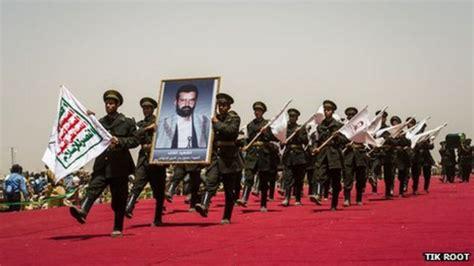
Countering the terrorist Houthis
Yemen’s Houthi terrorist movement recently made international headlines due to its attacks on shipping in the Red Sea. Initially, a Zaydi Shi’ite response to perceived marginalization, the Houthis have become a powerful force in Yemen’s brutal civil war thanks to the Iranian regime’s sponsorship, as shown by the Houthis’ successful conquest of the capital Sana’a in 2014.
The Zaydi Shi’ites are located in Yemen’s Saada province. Once dominant, Zaydism declined in the 20th century, and the Houthis first emerged in the 1980s as a Zaydi revivalist group. Initially focused on Zaydi interests, the group began to expand its scope around 2011, adopting a broader nationalist and populist agenda, focusing on “anti-imperialism,” opposition to external influences on Yemeni society and internal corruption. This led to a direct challenge to Yemen’s central government and ultimately civil war. The war has devastated Yemeni society, with over 80% of the population requiring aid.
Iran’s opportunistic and cynical support for the Houthis not only implicates it in this domestic carnage but also has considerable regional implications. It has turned the Yemeni civil war into a larger proxy war between Iran’s Shi’ite Islamic caliphate and Saudi Arabia. This has included Houthi missile attacks on Saudi targets and retaliatory Saudi air strikes.
Now, in the context of the Israel-Hamas war, the Houthis have emerged as little more than an Iranian missile base that can be used to disrupt global commerce at will. Despite this, the Houthis are not designated as a terrorist organization by the United States. Indeed, so far, America has mostly stayed on the sidelines, though this may be changing with the formation of a U.S.-led coalition to protect Red Sea shipping.
To effectively counter the Houthis and their Iranian sponsors, several policies should be considered:
1. Regional Cooperation: Foster diplomatic engagement between regional powers, particularly Saudi Arabia and the other Persian Gulf states, in order to reduce tensions and address the underlying issues fueling the conflict. This can help de-escalate the situation and lead to a sustainable resolution.
2. Strengthen International Alliances: Work closely with international partners, including the United Nations and the Arab League, in order to develop a coordinated response to the crisis and to mitigate the Houthis’ impact.
3. Enhanced Maritime Security: Increase maritime security measures in order to protect international shipping routes from Houthi threats. This includes enhanced patrolling and monitoring of strategic waterways like the Red Sea and the Gulf of Aden, which are vital for global trade and often targeted by Houthi attacks. Something like this appears to be taking shape.
4. Support the Yemeni Government: Strengthen the legitimate Yemeni government and local institutions in order to improve governance and service delivery. Build up their capacity to effectively counter the Houthis and address the root causes of the conflict, such as economic deprivation and political marginalization.
5. Counterterrorism Operations: Conduct precise and strategic counterterrorism operations against Houthi terrorists, particularly those involved in cross-border attacks and terrorist activities. These operations should be carefully planned to minimize civilian casualties and avoid further destabilizing the region. One effective approach is the elimination of key Houthi leaders.
6. Information and Propaganda Countermeasures: Counter the Houthis’ propaganda machine, as well as Iran’s, by promoting accurate information and countering misinformation campaigns. This involves supporting independent media in Yemen and the region to provide balanced and factual reporting. Invest in deradicalization programs and support initiatives that promote reconciliation between Yemen’s diverse social and political groups.
7. Long-Term Stability and Development Initiatives: These can include investments in infrastructure, education, health care and economic opportunity.
Effectively countering the Houthis requires a comprehensive strategy that combines diplomatic efforts, targeted sanctions, security measures and humanitarian assistance, while also addressing the broader geopolitical dynamics relating to Iran and regional stakeholders.
Source » jns.org





